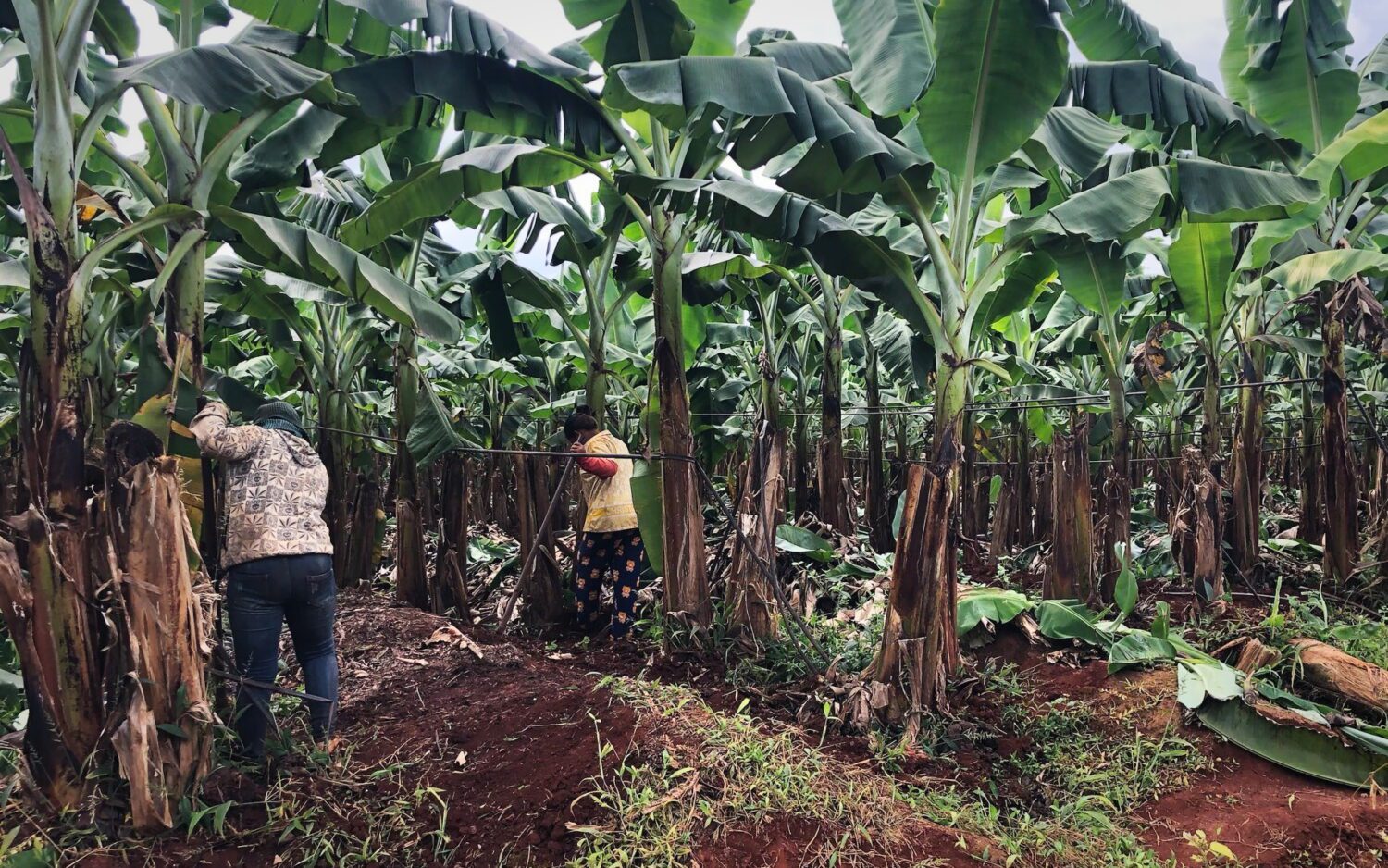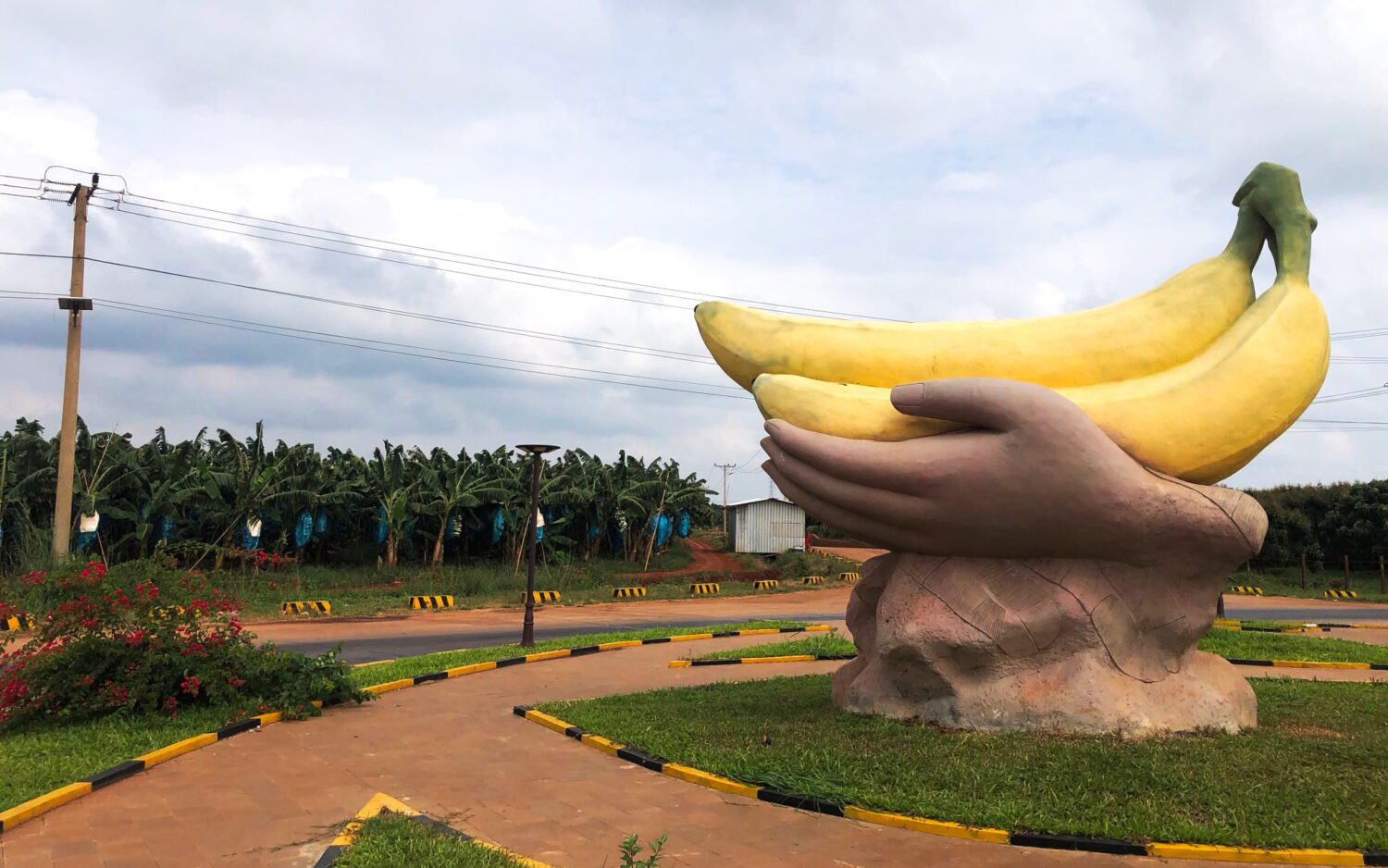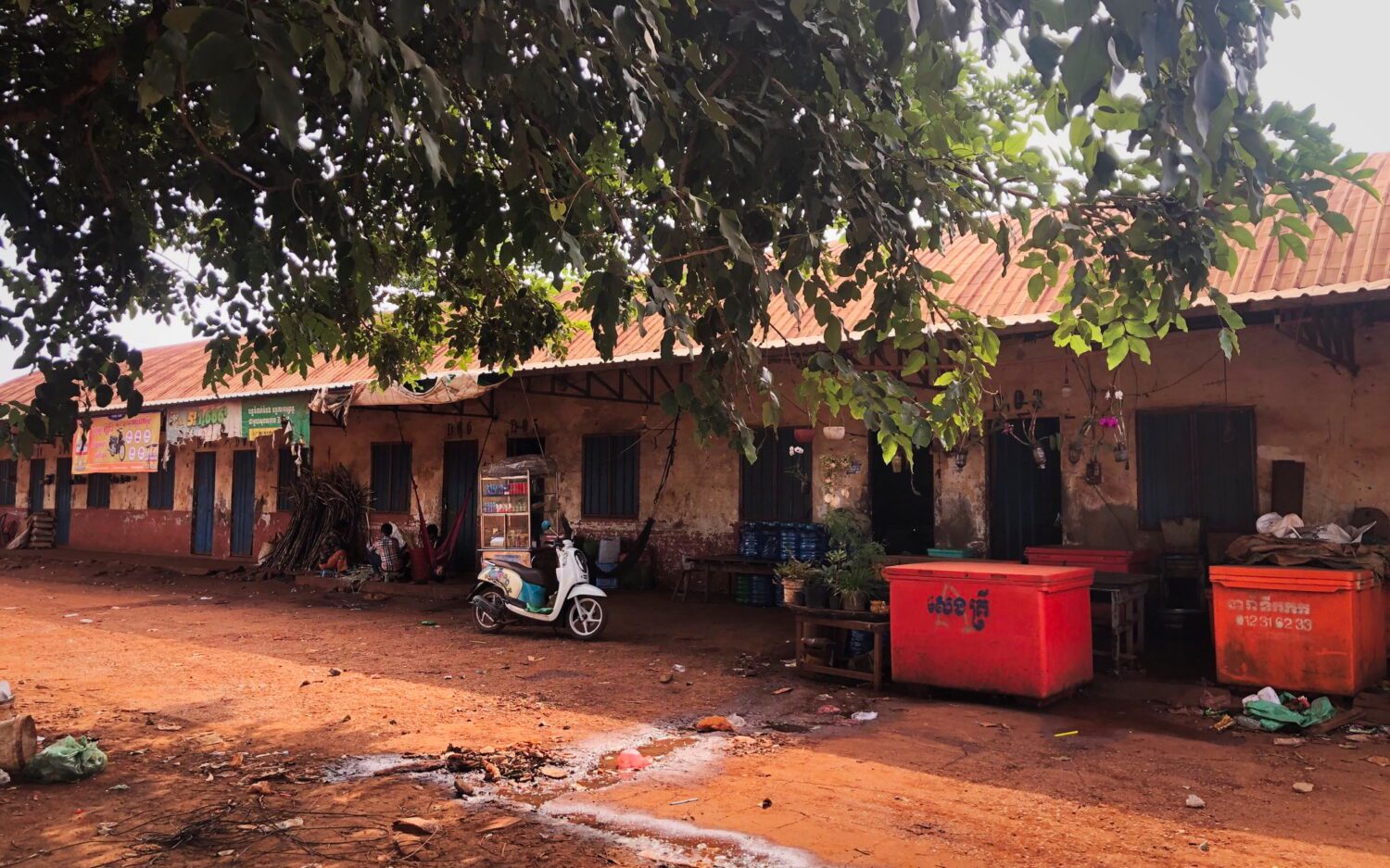STUNG TRANG DISTRICT, Kampong Cham — Workers at a Kampong Cham banana plantation where three people died and 66 others were hospitalized in late October are fleeing to their home provinces, fearful that exposure to pesticides stored near their onsite dormitories is behind the deadly incident.
Before the mass hospitalizations, people regularly fainted and felt dizzy on the job but were told their symptoms were a sign of laziness, current and former workers told VOD.
Starting the week of October 25, about one-third of the 200-some workers at a Long Sreng International plantation known as “Plantation 35” began feeling dizzy, having trouble breathing and experiencing chest pain. Two people died while being transported to the hospital and another at the district hospital.
The plantation is about 50 km north of Kampong Cham city, in an area where banana and rubber farms surround the main roadway and a chemical scent hangs in the air near plantation edges. Those who fell ill were mostly from Ratanakiri and other rural provinces and were recruited between six and two months ago.
Although officials have said that methanol poisoning from a batch of local wine was the main cause, dubious workers at Plantation 35 and another nearby Long Sreng farm say the incident underscores their dangerous living and working conditions: Workers are exposed daily to a potent mix of chemicals during and after working hours they say makes them ill, even if their roles don’t involve spraying pesticides directly.
Han Thorn, a 42-year-old chemical spray manager at the plantation, was hospitalized for two days alongside three family members after feeling sick starting the third week of October. In his nine years working on plantations, Thorn said he has never used the volume and variety of pesticides as during his two months of employment at Plantation 35 — making him suspicious wine could be the sole cause of the illness.
Now home in Kratie Province, he said he does not plan to return to the job.
“We were scared to death and terrified seeing so many of our colleagues falling sick at the same time,” Thorn said. “For me, I can hardly believe I’m alive as it was so difficult to breathe.”
Previous Illness
As she watched ambulances drive to and from the plantation for five days, another Plantation 35 worker felt her anxiety rising.
The worker, who declined to be named to protect her employment, does not spray bananas with pesticides herself. But the illness sounded like a more extreme version of what she experiences from secondary chemical exposure: faintness, nausea and intense stinging in her nose and throat. “I started panicking,” she said. “I don’t believe it happened because of wine.”
We were scared to death and terrified seeing so many of our colleagues falling sick at the same time.
Han Thorn, 42
More than five others at the 600-hectare Plantation 35, home to roughly 1,000 people, and a neighboring Long Sreng plantation reported similar health effects from pesticides. The farms are not accessible to the public, but reporters reached workers on their lunch break, at nearby dorms and while they moved between rows of banana trees near the road, sometimes with toddlers following behind.
Eak Mansot, 30, makes about $7 a day as a banana packer at the adjacent plantation. He’s not responsible for spraying bananas with pesticides himself, but said the chemical odor makes him constantly lightheaded and is difficult to breathe.
In the first week of November, Mansot’s fiance collapsed on the job and was sent to the hospital; she has since stopped working. He was terrified to hear of the deaths at the plantation next door, he said, while his partner experienced similar symptoms at the same time.
“We are also living and working in the same environment” as those at Plantation 35, he said. “We’re scared, but we don’t know what to do since it is the only work we have.”
Long Sreng International, a business registered to okhna Heng Long, owns both Mansot’s plantation and Plantation 35, but the latter is managed in partnership with a Chinese investor, according to workers and security badges. Oknha titles, translating to “lord,” are bestowed on tycoons who make a large donation to the state.
When reached by phone, a woman who described herself as a general manager at Long Sreng but who would not give her name said that wine was the “main cause” of the deaths and that the company follows correct technical standards for chemical usage.
“We did not have any problems like this before,” she said. “But the workers who just came to work here tend to drink wine every day, and plus we do not know if they already have any health problems before coming here.”
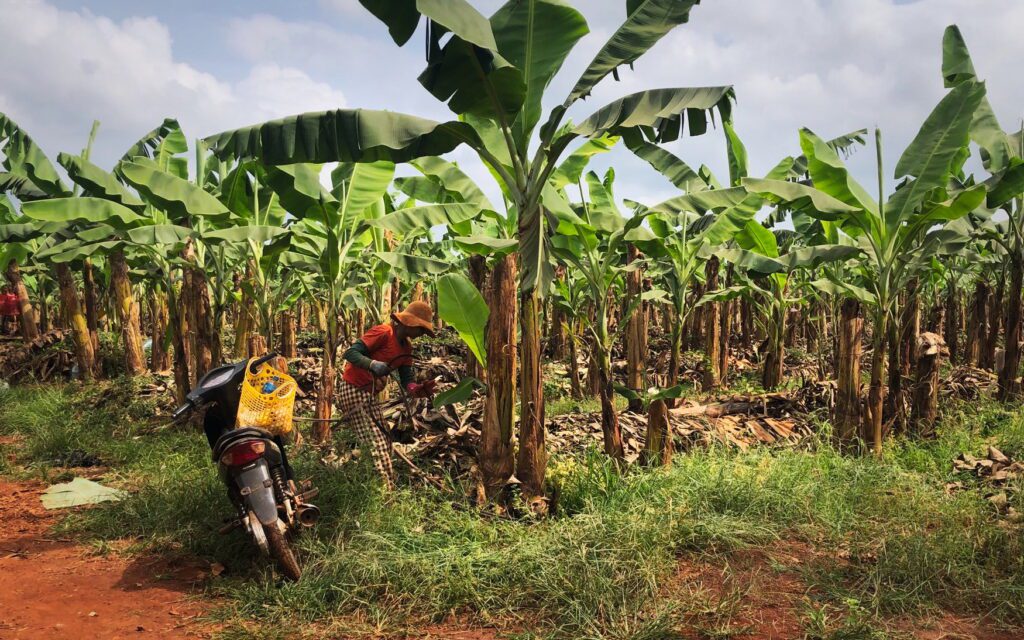
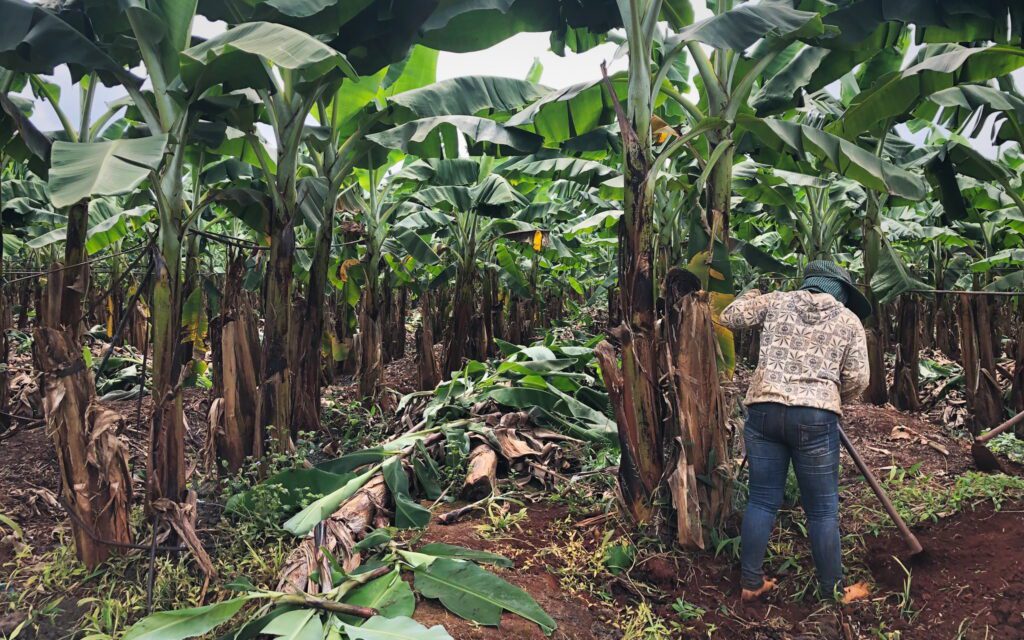
‘How Could It Not Affect Our Health?’
Dueling narratives have emerged about what could have caused the sudden wave of illness and death, with workers suspicious that chemicals are the main cause and health officials blaming poisonous alcohol.
Thorn, the chemical spray manager who was hospitalized, said that his job required mixing five to six different chemicals together to spray on the banana trees. Some workers do not wear masks while mixing, he said, and those that do still suffer intense headaches.
Returning to the onsite dormitories in the evening provides no relief because pesticides are housed in storage facilities next door, he said. And while the water storage unit is located farther away, the pipes carrying chemicals and water run adjacent to each other in the ground. Neither Thorn nor other workers had been advised of the names of the pesticides used or potential health effects.
Thorn said that his health has declined since starting work at Plantation 35 but he was afraid to take time off because his manager frequently berated his colleagues for trying to “find an excuse for not going to work.”
“We’re involved with the chemicals all day. And then when we arrive home, we still absorb the chemical smell spreading from the storage nearby. How could it not affect our health?” he said.
Two other Plantation 35 workers also pointed out that bringing alcohol inside the premises is not allowed, and those who drink do so secretly.
Khorn Bros, head of the Kampong Cham provincial administration, said that the police have checked two local stores where workers bought wine that they drank the night before they began falling ill. One of the stores, he said, was selling wine containing 9.3% methanol, far higher than the standard of 0.1%.
“Wine is the main cause of the deaths. They drank the high-methanol wine, which is very dangerous,” Bros said. “Chemical use is just the secondary cause of the incident.”
Stung Trang district hospital director Yim Navy said there is not yet confirmation of why the three workers died but “it is not right to say wine is the main cause or chemicals is the main cause.” Although wine caused the three deaths, Navy said, chemical exposure and chemical poisoning of food may have caused the hospitalizations.
We don’t know what to do since it is the only work we have.
Eak Mansot, 30
Workers Leaving Town
A store owner selling water, beer, instant coffee and snacks just up the road from Plantation 35 said workers have left town at all hours in recent days, their motos piled with boxes, bags and babies.
Among them was Lon Savoeun, who just started at Plantation 35 with her husband two months ago, living in the dormitories next door to those where the 69 workers got sick. The duo has since returned home to Stung Treng province.
“We heard the workers were severely sick, nearby where we were living, from the chemicals,” she told VOD by phone. “We don’t know exactly if it is real, but we were so concerned about our own safety since my husband was also a chemical sprayer.”
Savoeun isn’t sure what to think: “Luckily we’re not sick like other workers,” she said. “But we’re afraid that it will happen again, so we decided to leave the job and go back to do our own farming instead.”
Not everyone can afford to leave. A woman at the adjacent plantation who lives with four other relatives in a Long Sreng-provided shack said they were horrified by what had happened. But “before coming here we were farmers,” she said. “We couldn’t make enough.”


